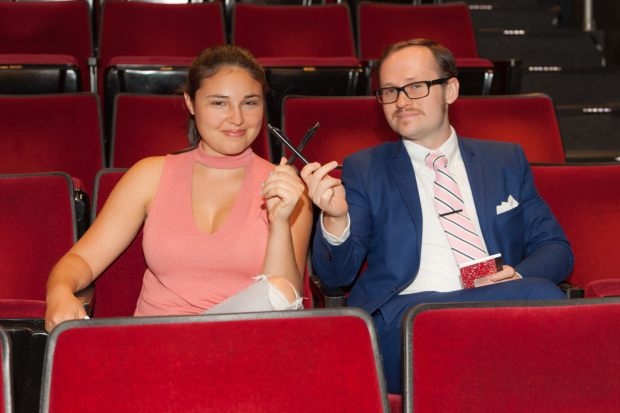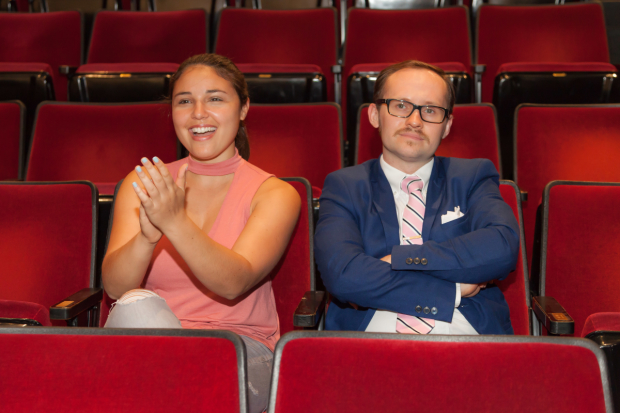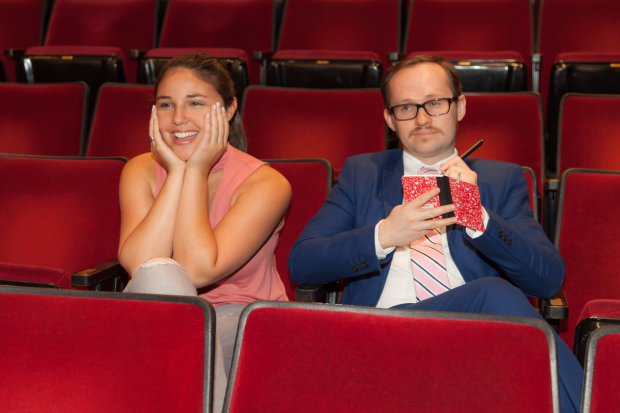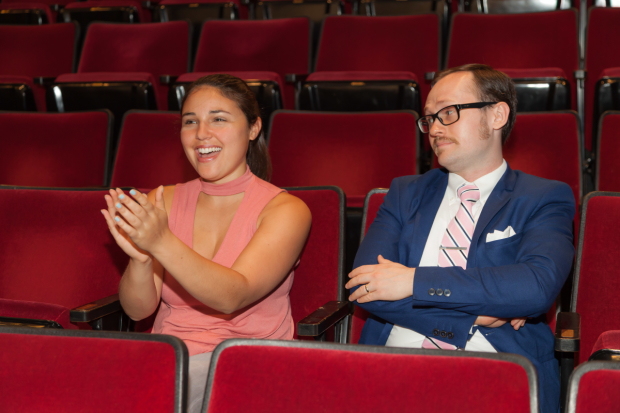Point-Counterpoint: Do Stars Deserve Applause Just for Showing Up?
Our critics debate the time-honored practice of entrance applause.
Everyone knows that you're supposed to clap at the end of a show, but what are we to make of the still-common practice of applauding stars when they step onstage? Some theatergoers see it as part of the experience, a way to express excitement and appreciation for a major talent. Others believe it to be a distraction that regularly spoils a play's delicate exposition. TheaterMania critic Hayley Levitt cheers this beloved theatrical tradition, and Zachary Stewart jeers in the following Point-Counterpoint.

(© Seth Walters)
Hayley Levitt: Zach, are you one of those people who keeps your arms crossed in silent protest of entrance applause?
Zachary Stewart: How did you know? I despise entrance applause. It seizes attention from the stage; it briefly breaks the spell of the play to remind us of the real person behind the character; and it slows the pace of the show, usually when it most needs to accelerate. I have no problem with an audience expressing its appreciation for a performer, but they ought to wait until the end.
Hayley: More often than not, the people getting entrance applause are the ones who are tapped to draw audiences based on who they are outside of the character they happen to be playing that night. When you go to the Shubert Theatre, you're not just seeing Hello, Dolly! You're seeing "Bette Midler in Hello, Dolly!" I'm not about to pretend I'm not breathing the same air as the Divine Miss M.
Zach: So are you admitting that entrance applause is not so much for the performer, but for you and your ability to procure a ticket?

(© Seth Walters)
Hayley: I think it's an outlet for the audience's excitement — and often gratitude to be seeing a particular actor onstage. Theater is uniquely special in its sense of history and the legacy surrounding it. Applauding entrances — like Elaine Stritch's in A Little Night Music, or Patti LuPone's as Mama Rose in Gypsy, or Kelli O'Hara's in The King and I — feels like a recognition of that tradition and an expression of our respect for it. There's a sense of kinship and camaraderie around it that's really nice. I think it's one of our more generous traditions.
Zach: That generosity is a double-edged sword, though. When an audience applauds a performer just for arriving onstage, it expresses confidence that the performer will be as good as that round of applause merits. It's audience adoration purchased on credit.
Hayley: If an actor we love turns out to be terrible, we're not going to be any less disappointed if we exercised self-restraint and sat silently during their entrance. If anything, that deadly silence can set a performance up for failure. How awkward would it be if Glenn Close walked regally down her Sunset Boulevard staircase to crickets? A dark cloud would just hang over the next two-and-a-half hours. The energy of that initial welcome can set the tone for the entire show.
Zach: It is certainly true that a clever director can exploit this predictable behavior. More often though, entrance applause interrupts a director's carefully calibrated pacing: The opening number of Hamilton is the tightest five minutes of musical exposition ever created, but the experience is somewhat less than breathtaking when we have to pause to acknowledge each new character with a roar from the audience.

(© Seth Walters)
Hayley: With Hamilton, let's appreciate the fact that we have thousands of people every week cheering for American revolutionaries like they were at an NSYNC reunion concert. The reason that's happening is because there's a sense of community and ownership in what's happening onstage (something Lin-Manuel Miranda is particularly talented at fostering). It might not make for the most well-paced performances, but it's energy like that that keeps theater alive. I'd say it's a worthwhile trade.
Zach: That may be true, but I still worry that the enthusiasm is often misplaced. Have you noticed that audiences disproportionately lavish their entrance applause on actors of a certain age? It's almost like we're saying to these working professionals, "Thanks for not dying before I bought a ticket."
Hayley: Well, that's morbid. It sounds like you see it as a practice in condescension, whereas in my idealistic brain, I see it as a sign of respect. Maybe you could argue that we've decided to mindlessly revere age, but you can take that up with the ancient Greeks.
Zach: As usual, I doubt we'll see eye-to-eye on this, but I will admit that you've taught me to appreciate one thing about entrance applause: the unintentional honesty. By giving the star an ovation before he or she has actually done anything, the audience betrays the real source of its esteem. It's not for the performance the actor gives that night, but for who they are and what seeing them represents for those lucky spectators.

(© Seth Walters)
Hayley: I think applause can serve more than one purpose. It just happens to be the only language an audience has to work with, so we conflate all of the separate intentions it might represent. It could be saying, "I'm honored to be in your presence," or, looking ahead to the fall, "Uma Thurman, I loved you in Kill Bill!" You can't mandate an audience's intention. So, if the applause is expressing something that is meant to make someone else happy, I say, Go with god. In the immortal words of Rizzo, "There are worse things I could do."
Zach: Yes, perhaps we ought to bring back tomatoes to give audiences a broader vocabulary.









